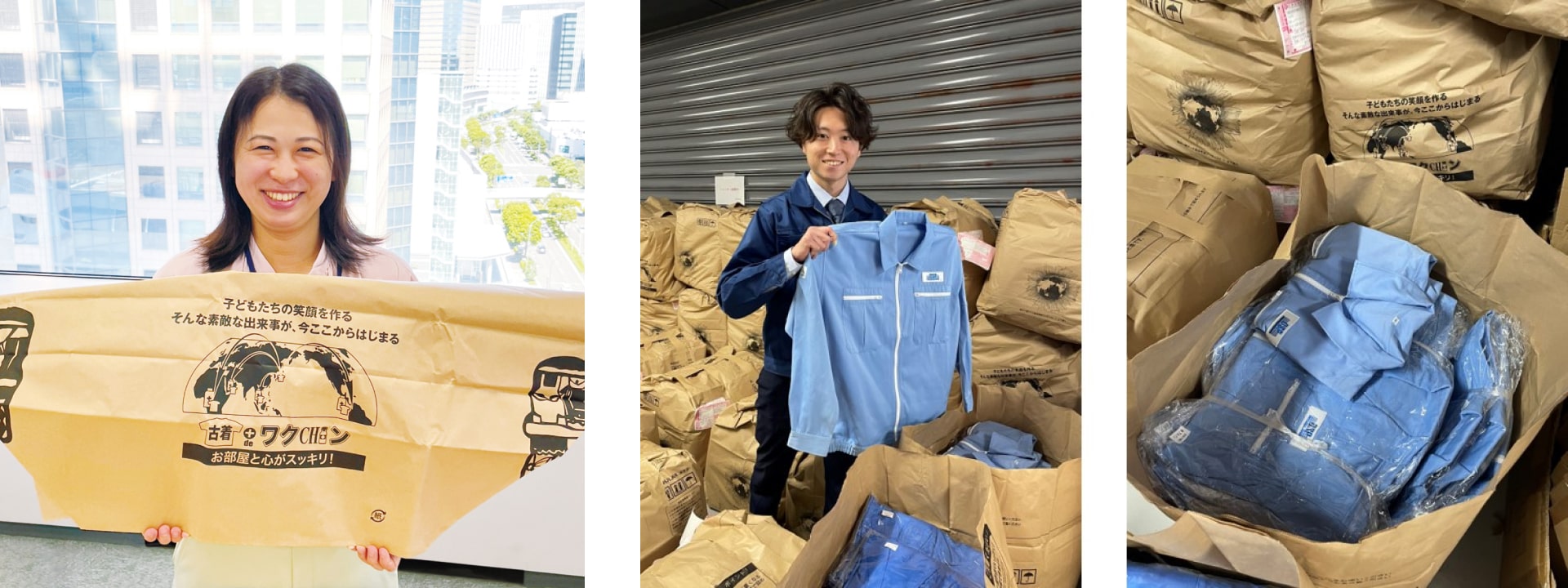- Home
- Sustainability
- Society
- Donating polio vaccines using unused uniforms

The "Old Clothes Vaccines Heartfelt Project" is an initiative in which people purchase special collection kits for unwanted clothing and fashion accessories in order to donate polio vaccines to children in developing countries through the certified NPO Japan Committee, Vaccines for the World's Children (JCV).
OSAKA SEALING PRINTING CO., LTD., a member of the OSP Group, has delivered a total of 1,500 polio vaccines to children in developing countries.

At 33 sales offices nationwide, the uniforms were no longer needed as the sales office staff changed to wearing casual clothes. When an employee at the Yokohama sales office learned that no use had been decided, he wondered, "Is there something we can do to make effective use of the uniforms?" and proposed the "Used Clothes for Vaccines" initiative, which he had known about for some time. The OSP Group decided to participate, as it has a sustainability policy and is working on the SDGs.
After that, the manufacturing and management departments, who learned about the sales department's initiative, expressed their desire to participate in the activity as well, and it was decided that they would participate for the second time, focusing on factory uniforms. In addition to donating vaccines, we will also raise employees' awareness of the SDGs by collecting clothing and other items.
By purchasing a special collection kit and sending unwanted clothing and fashion accessories, not only do people donate polio vaccines by purchasing the kit, but the process of the clothing and fashion accessories being reused in developing countries also creates connections with many people in society. The sorting and export of collected clothing, as well as sales around the world, creates new jobs, and the clothing contributes to decarbonization through sustainable use. The kits are manufactured at welfare workshops across the country, and the designs are created by artists and groups with disabilities, supporting artistic activities. Each step is connected, and this social contribution activity can achieve the following nine of the 17 SDGs goals:
The OSP Group is conducting "sustainable management" that aims to realize a sustainable society by responding to various changes in the social environment and balancing business activities with the resolution of social issues. Aiming to achieve harmony between the economy, society, and the environment through business activities, the Group is working on the SDGs by setting the following four sustainability policies: 1) the environment, 2) customers, 3) contribution to society and the community, and 4) human resource development and activity. This project is part of the initiative for 3) contribution to society and the community, "actively carrying out SDGs activities to promote harmony between job satisfaction and growth."
Sustainability Policy
1) Environment
1. We will set priorities and targets for reducing greenhouse gas emissions and put these into practice.
2. Streamline operations to curb resource and energy usage and reduce material waste.
3. Reduce the amount of plastic used by implementing product development initiatives and improving processes.
②Customer
1. We will carry out business activities that contribute to enriching people's lives and hearts.
2. Actively operate to ensure business continuity, and in particular exercises will follow a cycle of plan, verify, and evaluate.
3. Conduct business impact analysis and optimize management resources.
3) Contribution to society and the community
1. Review materials and processes, and manufacture and supply products that take food contact into consideration.
2. We will actively engage in SDGs activities based on the United Nations Global Compact, and promote the balance between job satisfaction and growth.
④ Human resource development and activity
1. We provide an environment in which employees can work comfortably, taking into consideration the diversity of work styles and the active participation of women, the elderly, and people with disabilities.
2. Provide education and training to acquire high levels of expertise, including on the SDGs.